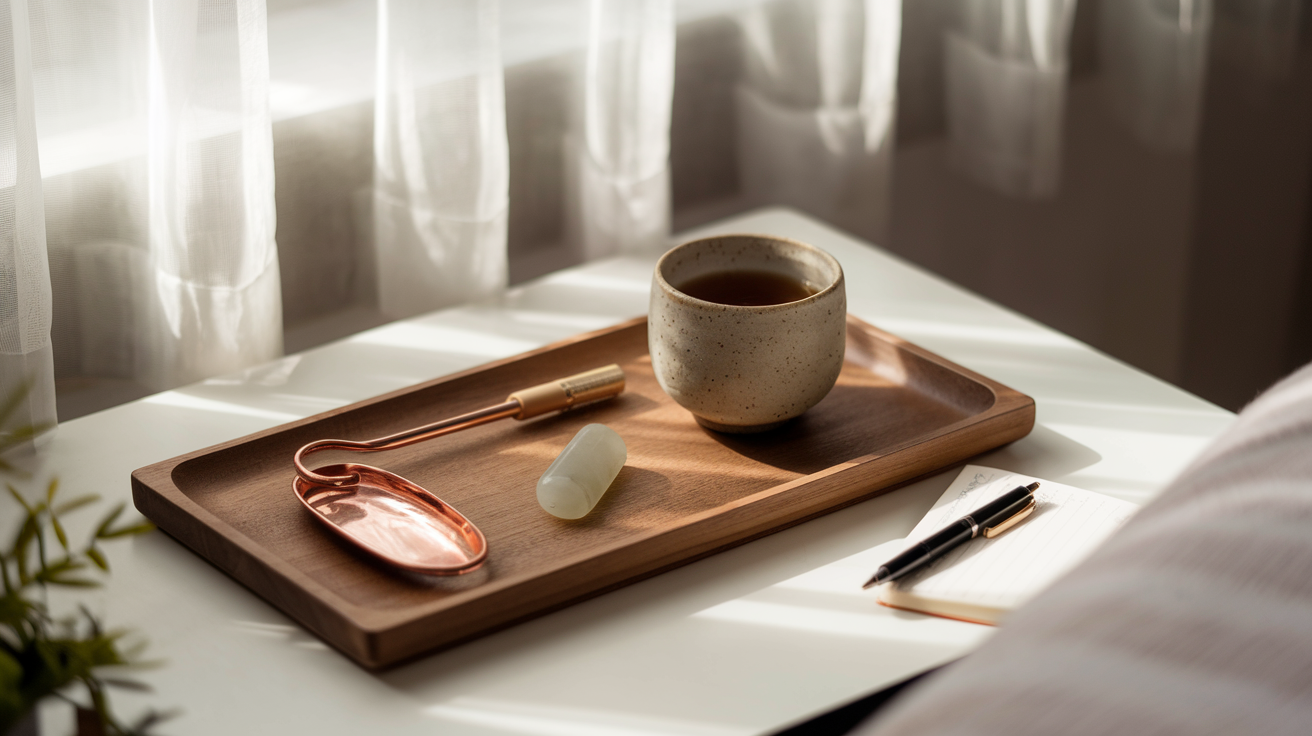Ancient Ayurvedic wisdom might actually hold the solution we've been reaching for between snooze buttons. Our Morning Clarity Kit combines traditional Ayurveda-based rituals with modern self-care techniques that actually fit into your chaotic schedule.
The difference between stumbling through your day and owning it often comes down to those first 20 minutes after opening your eyes. People who master their mornings don't have extra hours—they just have better tools.
But here's what nobody's telling you about morning routines: the secret isn't just WHAT you do, but HOW your body physiologically responds to it...
Understanding Ayurveda: The Science of Life

Ancient wisdom for modern wellness
Ever wondered why Ayurveda has survived for over 5,000 years? It's not just some trendy wellness fad that'll disappear next season. This ancient medical system has stood the test of time because it works.
Ayurveda translates to "knowledge of life" in Sanskrit, and that's exactly what it offers – a complete roadmap for living in harmony with nature and yourself. While modern medicine often treats symptoms after they appear, Ayurveda takes a different approach. It focuses on prevention and treats the whole person – body, mind, and spirit.
Think about it. In our fast-paced digital world, we're constantly bombarded with notifications, deadlines, and stress. We pop pills for headaches without addressing why we get them in the first place. Ayurveda flips this model on its head.
The beauty of Ayurveda lies in its personalization. Unlike one-size-fits-all wellness trends, Ayurveda recognizes that each person has a unique constitution. What works for your friend might not work for you, and that's perfectly fine. Ayurveda gives you tools to understand your unique makeup and how to maintain balance.
And here's the thing – you don't need to overhaul your entire life to benefit from Ayurvedic wisdom. Small, consistent changes make the biggest difference. Morning tongue scraping, mindful eating, or adjusting your sleep schedule according to your dosha can transform how you feel day to day.
Many modern wellness practices actually have roots in Ayurveda. That turmeric latte you love? Ayurveda has been using turmeric as medicine for centuries. Meditation and mindfulness? Core Ayurvedic practices. Oil pulling? An ancient Ayurvedic dental technique.
The three doshas: Vata, Pitta, and Kapha
Your body isn't just a random collection of cells and systems. According to Ayurveda, it's governed by three energetic forces called doshas. These doshas – Vata, Pitta, and Kapha – are present in everyone, but usually one or two dominate.
Vata is like the wind – quick, light, and changeable. If you're creative, enthusiastic, and quick to learn but also prone to anxiety and irregular habits, you might have a strong Vata influence. Vata types often have dry skin, cold hands and feet, and irregular hunger patterns.
Pitta brings fire and transformation. People with strong Pitta tend to be focused, ambitious, and precise. They're the natural leaders who get things done but might struggle with impatience or irritability when out of balance. Physically, they often have warm bodies, sharp hunger, and strong digestion.
Kapha provides structure and stability like earth and water. Those with dominant Kapha are typically calm, compassionate, and reliable. They have excellent stamina but might become stubborn or resistant to change when imbalanced. Kapha types generally have smooth skin, steady energy, and slow but strong digestion.
Here's a quick breakdown of these three fundamental energies:
| Dosha | Elements | Qualities | Mental Traits | Physical Traits |
|---|---|---|---|---|
| Vata | Air & Space | Light, cold, dry, mobile | Creative, quick, anxious when imbalanced | Thin frame, dry skin, irregular appetite |
| Pitta | Fire & Water | Hot, sharp, light, oily | Focused, intelligent, irritable when imbalanced | Medium build, warm skin, strong hunger |
| Kapha | Earth & Water | Heavy, slow, cool, oily | Calm, loyal, resistant to change when imbalanced | Solid frame, smooth skin, steady energy |
Understanding your dominant dosha isn't about putting yourself in a box. It's about recognizing your natural tendencies and learning how to maintain balance. Everyone has all three doshas, just in different proportions.
Most people aren't purely one dosha – they're a unique mix. You might have a Vata-Pitta constitution or Pitta-Kapha. Your constitution stays the same throughout your life, but your current state can fluctuate based on lifestyle, diet, seasons, and stress.
The goal isn't to suppress your dominant dosha but to keep it in check so it doesn't become excessive. For example, a Vata type won't suddenly become Kapha, but they can develop more Kapha-like qualities to balance their natural Vata tendencies.
How Ayurveda promotes mental clarity and sensory awareness
The mind-body connection isn't just a catchy wellness phrase in Ayurveda – it's the foundation of the entire system. Clear thinking doesn't come from pushing your brain harder. It comes from creating the right conditions for clarity to emerge naturally.
Ayurveda recognizes that mental fog, anxiety, and burnout aren't separate from physical health. They're direct results of doshas falling out of balance. When your doshas are in harmony, mental clarity follows naturally.
Take sensory awareness. In our hyper-stimulating world, our senses get overwhelmed. We scroll through social media while watching TV and eating dinner. Ayurveda teaches us to slow down and fully experience one sensory input at a time.
Simple practices like mindful eating can dramatically shift your relationship with food and improve digestion. Instead of scarfing down lunch at your desk, try eating without distractions. Notice the flavors, textures, and aromas. Your digestion improves, and so does your mental state.
Ayurveda also offers specific herbs and foods that support brain function. Brahmi (Bacopa monnieri) has been used for centuries to enhance memory and cognitive function. Modern research confirms what Ayurvedic practitioners have known for thousands of years – it works. Same goes for ashwagandha for stress relief and turmeric for inflammation reduction.
The practice of nasya – applying medicated oil to the nasal passages – directly targets the brain by clearing the pathways to the head. It's particularly effective for clearing mental fog and enhancing sensory perception.
Meditation and breathwork are crucial for mental clarity in Ayurveda. They're not add-ons or nice-to-haves; they're essential daily practices. Even five minutes of focused breathing can reset your nervous system and bring you back to center.
What makes Ayurveda special is how it tailors these practices to your dosha. If you're Vata-dominant and scattered, you need grounding practices. If you're Pitta and overthinking, you need cooling techniques. If you're Kapha and feeling stuck, you need energizing approaches.
The importance of dinacharya (daily rituals) in Ayurvedic practice
Consistency beats intensity every time. That's the philosophy behind dinacharya – the Ayurvedic concept of daily routine. It's not about radical changes; it's about simple, consistent practices that align you with natural rhythms.
Your body craves routine. It functions best when you wake, eat, and sleep at consistent times. Dinacharya provides this framework, creating stability that allows your body to heal and thrive.
Morning rituals set the tone for your entire day. When you start with intentional practices rather than grabbing your phone to check emails, you create a foundation of mindfulness that carries through your activities.
Some core elements of an Ayurvedic morning routine include:
-
Waking before sunrise (ideally during Brahma muhurta, around 4-6 AM)
-
Eliminating waste
-
Cleaning the tongue and teeth
-
Drinking warm water to stimulate digestion
-
Self-massage with oil (abhyanga)
-
Bathing
-
Gentle movement or yoga
-
Meditation or breathwork
-
Eating a nourishing breakfast appropriate for your dosha
You don't need to implement everything at once. Start with one or two practices that resonate with you, and build from there.
Evening rituals are equally important. They signal to your body that it's time to wind down and prepare for rest. Avoiding screens, enjoying a light dinner at least three hours before bed, and perhaps sipping warm milk with calming spices can transform your sleep quality.
Seasonal routines (ritucharya) complement your daily practices. Just as nature shifts with the seasons, your body needs different support throughout the year. Spring calls for detoxification, summer for cooling practices, autumn for building strength, and winter for nourishment and rest.
These aren't rigid rules but flexible guidelines. The beauty of dinacharya is how it can be adapted to modern life. Can't do a full self-massage every morning? Even a quick oil application to your feet and scalp brings benefits. Can't wake before sunrise in winter? Focus on maintaining consistent wake times instead.
The power of ritual lies in its ability to bring mindfulness to ordinary activities. Brushing your teeth becomes an act of self-care. Preparing food becomes a meditation. Walking becomes a connection with nature.
When dinacharya becomes second nature, you spend less energy deciding what to do and when. This frees mental space for creativity, problem-solving, and presence – exactly what our Morning Clarity Kit aims to support.
The Power of Morning Rituals for Mind-Body Harmony

Why the first hour after waking shapes your entire day
Ever noticed how a rough morning seems to snowball into a chaotic day? That's not just bad luck—it's science.
Those first 60 minutes after your eyes open are golden. They set the tone for everything that follows. Your brain is literally coming back online, and whatever input it receives first becomes the foundation for your day's mental patterns.
Think about it this way: your mind is like fresh snow each morning. The first tracks you make will guide all the footsteps that follow.
When you reach for your phone first thing and dive into emails or social media, you're immediately putting your brain in response mode. You're telling your nervous system, "Hey, be ready for constant interruptions today!" And trust me, your body listens.
But flip the script. What if those first moments were intentional instead? What if you gave yourself the gift of presence before demands?
People who guard their morning hour report:
-
64% better focus throughout the day
-
Reduced anxiety levels
-
Higher creativity during work hours
-
More consistent energy (without the 2 PM crash)
I used to be that person who'd hit snooze four times, then panic-scroll through notifications while brushing my teeth. My days felt like I was constantly playing catch-up. Now? My phone stays untouched until after my morning rituals. The difference is night and day.
Your brain is particularly receptive to programming during this time because your subconscious mind hasn't fully transitioned to analytical thinking. It's why many spiritual traditions worldwide consider dawn a sacred hour for meditation and intention-setting.
In Ayurveda, this early morning period aligns with Vata energy—light, creative, and receptive. It's the perfect time to plant the seeds of how you want your day to unfold.
Creating sacred space for morning practices
Your environment shapes your practices more than willpower ever could.
A dedicated morning space doesn't need to be fancy or large. Even a small corner of a room can become your sanctuary if you approach it with intention.
What makes a space "sacred" isn't religious symbols or expensive props—it's the boundary you create around it. It's saying: "This spot is different. This is where I come to center myself."
Start by decluttering. Physical clutter creates mental noise, and that's exactly what we're trying to reduce. Choose a spot with natural light if possible—sunlight naturally resets your circadian rhythm and boosts serotonin production.
Consider these simple elements for your morning space:
-
A comfortable cushion or chair that supports good posture
-
Something living (a small plant brings vitality)
-
A pleasant scent (incense, essential oils, or fresh air)
-
A meaningful object that grounds you (could be a stone, photo, or symbol)
-
Natural materials that connect you to the earth (wood, cotton, wool)
I've seen transformation in clients who created even the simplest dedicated spaces. Take Maya, who lived in a tiny studio apartment. She cleared her nightstand, added a small plant, and placed a beautiful bowl for her morning tea ritual. That two-square-foot area became her anchor through a challenging career transition.
Your space becomes sacred through consistent use. Each time you show up there with intention, you're strengthening neural pathways that tell your brain: "When I'm here, I center myself."
This is particularly powerful from an Ayurvedic perspective, which teaches that our environments directly impact our doshas (mind-body constitutions). A calm, intentional space helps balance excess Vata (anxiety, scattered energy) and can ground you for the day ahead.
Think of this space as your launching pad. You wouldn't start a journey without knowing where you're departing from. Your sacred morning space is that stable point of departure for each day's journey.
How consistent rituals reset your nervous system
Your body craves predictability more than you realize.
Consistent morning rituals work because they speak directly to your autonomic nervous system—the part of you that controls fight-or-flight responses. When you establish patterns your body can count on, you're essentially telling your nervous system, "It's safe to relax. We know what happens next."
This is huge in our unpredictable world.
The science is fascinating: regular morning rituals have been shown to lower cortisol levels throughout the entire day. That means less stress, better immune function, and improved cognitive performance—just from giving your body a reliable start.
But here's what most people miss: it's not about cramming in fifteen "optimal" practices. It's about consistency with even one or two meaningful rituals.
Consider these simple but powerful practices:
-
5 minutes of diaphragmatic breathing
-
Drinking warm water with lemon before anything else
-
Gentle movement that awakens the spine
-
Writing three intentions for the day
-
Tongue scraping and oil pulling (traditional Ayurvedic practices)
The magic happens when these become non-negotiable. Not in a rigid, stressful way, but as compassionate appointments you keep with yourself.
One client, James, struggled with chronic anxiety that peaked mid-morning at work. We implemented just two morning rituals: oil massage for his temples and soles of feet (Ayurvedic abhyanga) and five minutes of alternate nostril breathing. Within three weeks, his coworkers noticed the difference before he did. His system had recalibrated.
Your nervous system remembers. Each time you honor your morning ritual, you're training your body's stress response. You're creating a physiological pattern of calm that becomes your default state rather than an occasional achievement.
The Sanskrit concept of "dinacharya" (daily routine) has emphasized this for thousands of years—long before modern science confirmed its neurological benefits. Your body operates best when it can predict what's coming next.
Start small, but start tomorrow. One consistent practice is worth more than an elaborate routine you'll abandon by next week.
Aligning with natural rhythms for optimal energy
Fighting against nature's cycles is exhausting. Swimming with them is effortless.
Your body isn't just in the world—it's of the world. The same rhythms that cause tides to rise and fall influence your energy levels, hormonal cycles, and cognitive function.
Ayurveda recognized this thousands of years ago through the concept of doshas and their daily cycles. Modern chronobiology now confirms what ancient wisdom knew: different times of day are naturally suited to different activities.
The early morning hours (roughly 6-10 AM) align with Kapha energy—stable, grounded, but potentially sluggish if not activated. This is why morning movement is so crucial—it transforms potential heaviness into sustainable energy.
Consider how your energy naturally flows:
-
6-10 AM: Ideal for grounding practices, setting intentions, gentle movement
-
10 AM-2 PM: Peak mental alertness, perfect for complex tasks and decisions
-
2-6 PM: Creative energy rises as analytical thinking declines
-
6-10 PM: Natural unwinding period, best for connection and reflection
When you plan your day against these natural currents, you're working twice as hard for half the results.
I see this with clients constantly. Take Priya, who forced herself to exercise after work when her energy was lowest. She switched to morning movement—just 15 minutes of sun salutations—and not only did her consistency improve, but her afternoon productivity skyrocketed.
The most powerful alignment comes from honoring the sunrise-sunset cycle. Exposure to natural light within an hour of waking literally resets your entire hormonal cascade for the day. It triggers your pineal gland to begin the melatonin countdown that will help you sleep properly that night.
This isn't just wellness theory—it's practical energy management. People who align their important tasks with their natural energy rhythms report needing less caffeine, experiencing fewer afternoon crashes, and feeling more satisfied with their productivity.
Start noticing your natural energy patterns. Where are you fighting upstream? Where could you be flowing with your body's innate wisdom instead?
Your morning clarity doesn't have to come from forcing yourself into someone else's ideal routine. It comes from honoring the rhythm that already exists within you and the natural world around you.
The most sustainable energy comes not from pushing harder, but from aligning better.
Components of the Ayurveda Morning Clarity Kit

A. Tongue scraper: Removing ama for fresh breath and digestion
Picture this: you wake up in the morning with that all-too-familiar fuzzy coating on your tongue. Gross, right? That's what Ayurveda calls "ama" – essentially toxins that have accumulated in your body overnight.
A tongue scraper isn't just some trendy wellness tool. It's actually been used in Ayurvedic medicine for thousands of years. Unlike your toothbrush (which just pushes bacteria around), a proper copper or stainless steel tongue scraper gently removes that layer of gunk from your tongue's surface.
Here's what happens when you make tongue scraping part of your morning ritual:
-
Your taste buds wake up. Food literally tastes better when your tongue isn't coated in yesterday's toxins.
-
Your breath improves dramatically. Most bad breath comes from bacteria hanging out on your tongue, not your teeth.
-
Your digestion gets a boost. In Ayurveda, tongue scraping stimulates the digestive organs through nerve connections.
-
You become more in tune with your health. The appearance of your tongue (color, coating, texture) can tell you tons about what's happening inside your body.
The proper technique matters too. Hold the scraper at both ends, stick your tongue out, place the scraper at the back of your tongue, and pull forward with gentle pressure. Rinse and repeat 7-10 times until no residue appears.
Many people skip this step because it seems like extra work. But we're talking about 30 seconds that can transform your oral health and jumpstart your digestion for the day. Kind of a no-brainer when you think about it.
B. Neti pot and nasya oil: Clear breathing for mental focus
When your nose is stuffed up or irritated, your whole brain feels foggy. That's not just your imagination – there's a direct connection between clear nasal passages and mental clarity.
The neti pot looks like a small teapot with a spout, and it's been used in Ayurvedic practice for centuries. It works by gently flushing your nasal passages with a saline solution, washing away:
-
Dust and allergens
-
Excess mucus
-
Environmental pollutants
-
Anything else clogging up your breathing pathways
After using a neti pot, many people experience:
-
Easier breathing (obviously)
-
Reduced sinus pressure
-
Fewer allergy symptoms
-
Improved mental clarity
-
Enhanced meditation experiences
But here's where most people go wrong: they stop after the neti pot. In traditional Ayurveda, nasal irrigation is followed by nasya oil application. This warming, nourishing oil (typically sesame-based with herbs) moisturizes the nasal passages that were just cleaned.
Think of it like this: you wouldn't wash your face and then not moisturize, right? Same principle.
The nasya oil does more than just moisturize though. It:
-
Protects the clean nasal passages from new irritants
-
Lubricates the delicate tissues
-
Stimulates prana (life force) in Ayurvedic thinking
-
Creates a barrier against airborne bacteria and viruses
When you combine these two practices—neti pot followed by nasya oil—you're creating optimal conditions for breathing. And when you breathe better, you think better. It's as simple as that.
Many people notice they can focus longer, think more clearly, and feel more present after clearing their nasal passages this way. Your Morning Clarity Kit includes both tools because they work in tandem, not separately.
C. Meditation cushion and timer: Supporting stillness and presence
The biggest lie about meditation is that you need to "empty your mind" to do it right.
The truth? Meditation isn't about having zero thoughts—it's about creating a different relationship with the thoughts you already have.
Your meditation cushion (or zafu) in the Morning Clarity Kit isn't just a pretty floor pillow. It's engineered to support proper posture during meditation. When your spine is aligned correctly, you can sit comfortably for longer periods without the distraction of physical discomfort.
The height and firmness matter—too soft and you'll slouch, too hard and you'll get uncomfortable quickly. This cushion hits the sweet spot, allowing your hips to elevate slightly above your knees when cross-legged, creating that natural S-curve in your spine.
But having the right cushion is only half the equation. The meditation timer included in your kit solves the other major meditation roadblock: the constant temptation to check the time.
Have you ever tried meditating while occasionally peeking at your phone or clock? Each time you do, you're yanking yourself out of the present moment. The gentle sound of the timer creates a container for your practice—you can fully surrender to the experience knowing you won't miss your next meeting or obligation.
The best part about the timer and cushion combo is how they work together to eliminate the most common excuses for not meditating:
-
"I'm not comfortable sitting on the floor" (cushion solves this)
-
"I don't know how long I've been sitting" (timer solves this)
-
"I'm afraid I'll lose track of time" (timer again)
-
"My back hurts when I meditate" (proper cushion height fixes this)
Even 5-10 minutes of seated meditation each morning can dramatically shift your day. You're essentially training your brain to return to a centered state on command—a skill that becomes invaluable during stressful moments later in the day.
D. Aromatherapy essentials: Awakening the senses naturally
Your nose is a direct pathway to your brain. No, seriously—scent molecules take a shortcut past all the usual sensory processing centers and go straight to your limbic system, the emotional and memory center of your brain.
That's why certain smells can instantly transport you back to childhood or dramatically shift your mood in seconds.
The aromatherapy components in your Morning Clarity Kit aren't random pleasant scents. They're specifically chosen based on Ayurvedic principles to balance your doshas (your unique mind-body constitution) and support mental clarity.
The kit includes:
-
Rosemary essential oil: Enhances memory and mental performance
-
Peppermint essential oil: Improves alertness and clears congestion
-
Lemon essential oil: Uplifts mood and promotes concentration
-
Sandalwood incense: Creates a sacred atmosphere for meditation
-
Brass incense holder: Properly contains ashes and prevents burns
These aromatic tools work in different ways. The essential oils can be:
-
Added to a diffuser to fill your space
-
Placed on a tissue and inhaled directly
-
Applied diluted to pulse points (with carrier oil)
-
Added to your morning shower for an immersive experience
The sandalwood incense creates a ritual marker—lighting it signals to your brain that it's time to shift into your morning clarity practice. The smoke itself has been used in purification ceremonies across cultures for thousands of years.
What's remarkable about aromatherapy is how quickly it works. Unlike many wellness practices that require weeks to show benefits, scent creates nearly instant changes in brain activity. You'll likely notice effects on your first use.
E. Herbal supplements: Nourishing the mind-body connection
In Ayurveda, herbs aren't just add-ons to a wellness routine—they're central players. The herbs included in your Morning Clarity Kit have been used for centuries to support cognitive function, reduce stress, and create balance.
The kit includes these potent botanical allies:
-
Brahmi (Bacopa monnieri): The ultimate brain herb. Research shows it supports memory, reduces anxiety, and helps the body adapt to stress. It's particularly effective when taken consistently over time.
-
Ashwagandha (Withania somnifera): This adaptogenic powerhouse helps your body respond appropriately to stress. It's like having a volume knob for your stress response—turning down the intensity when it gets too high.
-
Tulsi (Holy Basil): Called the "Queen of Herbs" in Ayurveda, tulsi supports mental clarity while simultaneously calming the nervous system. It's the perfect balance of alertness without jitters.
-
Shankhpushpi (Convolvulus pluricaulis): This lesser-known but powerful herb specifically targets mental fatigue and supports brain health.
These herbs come in convenient capsule form, but the kit also includes loose tea blends combining these herbs for a more ritualistic morning experience.
What makes these herbs different from, say, chugging coffee? They work with your body's natural systems rather than overriding them. Coffee forces your body into an alert state by triggering stress hormones. These herbs support your natural energy and focus without the crash later.
The difference becomes obvious after a few weeks of consistent use. Rather than the artificial peaks and valleys of stimulant-based morning routines, you'll notice a more sustainable, clean energy that carries you through your day.
Establishing Your Personalized Morning Routine

Determining your dominant dosha for tailored practices
Your morning routine isn't just about checking tasks off a list—it's about honoring your unique constitution. In Ayurveda, this constitution is known as your dosha.
Think of doshas as your body's natural tendency. There are three main types: Vata (air and space), Pitta (fire and water), and Kapha (earth and water). Most people have one or two dominant doshas that influence everything from digestion to how you respond to stress.
Here's a quick way to identify which dosha might be running your show:
Vata dominant? You're likely creative, energetic, and quick-thinking. Your body frame tends to be slim, and you might experience dry skin, cold hands and feet, or irregular digestion. Your mind races a mile a minute—especially when stressed.
Pitta dominant? You're probably ambitious, sharp-minded, and structured. Medium build with warm skin and strong digestion are common Pitta traits. When out of balance, you might feel irritable or overheated.
Kapha dominant? You're naturally calm, compassionate, and steady. Your body is likely sturdy with smooth skin and thick hair. You tend to move deliberately and prefer routine—sometimes to the point of resistance to change.
Not sure which sounds most like you? Try taking a simple dosha quiz online or—even better—consult with an Ayurvedic practitioner who can help identify your specific constitution.
Once you know your dominant dosha, you can craft morning practices that specifically balance your natural tendencies:
-
Vata mornings benefit from consistency, warmth, and grounding activities. Set a regular wake-up time and avoid rushing.
-
Pitta mornings thrive with cooling practices, moderation, and activities that channel your natural drive productively.
-
Kapha mornings need stimulation, variety, and movement to counteract the tendency to sleep in or move slowly.
Remember, your dosha isn't just who you are—it's your roadmap to balance. When you align your morning routine with your constitution, you're not fighting against your nature but working with it.
Five-minute rituals for busy mornings
The modern world moves fast, and sometimes five minutes is all you've got. But even brief moments of intentional practice can transform your day. The key? Choose quality over quantity.
For Vata types (when time is tight):
-
Oil pulling for just 2 minutes while showering (use sesame oil for its warming properties)
-
Three rounds of alternate nostril breathing to calm the nervous system
-
A quick cup of ginger tea with a pinch of cinnamon to kindle digestion
For Pitta types (when the clock's ticking):
-
Cool water splash on face and wrists to temper your natural heat
-
Three minutes of cooling breath (inhale through mouth, exhale through nose)
-
Quick coconut oil massage on your feet and scalp before dressing
For Kapha types (when minutes matter):
-
Dry brushing for 2 minutes to stimulate circulation
-
10 sun salutations performed at a brisk pace
-
Ginger and lemon in warm water to kickstart metabolism
No matter your dosha, there's one five-minute ritual that benefits everyone: gratitude. Before grabbing your phone or jumping into emails, simply name three things you're thankful for. This tiny practice reorients your brain toward positivity and presence.
Another universal quick hit? Step outside. Fresh air and natural light signal to your body that it's daytime, helping reset your circadian rhythm. Even just 60 seconds of outdoor time can boost your mood and energy.
The beauty of these compact practices is their portability. Traveling? Crazy morning ahead? These don't require special equipment or perfect conditions—just your attention for a few minutes.
And here's the real magic: these five-minute rituals often become gateways to deeper practice. Start small, be consistent, and watch how these brief moments begin to expand naturally as you experience their benefits.
Extended practices for deeper benefits
When you've got more time—weekends, days off, or intentionally carved-out morning space—you can deepen your Ayurvedic morning routine for more profound benefits. These extended practices aren't just "nice to have"—they're investments in your long-term wellbeing.
Complete Dinacharya (Daily Routine) Sequence:
-
Wake before sunrise (ideally during Brahma Muhurta, 4:00-6:00 am) when the veil between consciousness and subconsciousness is thinnest
-
Tongue scraping to remove accumulated ama (toxins)
-
Oil pulling for a full 10-15 minutes to draw out impurities
-
Neti pot and nasya oil to clear and nourish nasal passages
-
Abhyanga (self-massage with warm oil) for 15-20 minutes
-
Warm shower to rinse oil and open channels
-
Meditation for 20-30 minutes to set your mental state
-
Pranayama (breath practices) for 10-15 minutes
-
Gentle yoga for 20-30 minutes tailored to your dosha
-
Preparing and eating a mindful breakfast appropriate for your constitution
For Vata types, this extended routine creates the stability your nervous system craves. The self-massage is particularly beneficial—use sesame oil in winter and coconut oil in summer, applying it with long, gentle strokes.
Pitta types benefit enormously from the cooling aspects of this routine, especially meditation and calming pranayama like sheetali (cooling breath). Your self-massage should use coconut or sunflower oil with medium pressure.
Kapha constitutions thrive with the stimulating elements of this sequence. Your self-massage should be vigorous using lighter oils like mustard seed or safflower, and your yoga practice should be energizing.
On days when you practice this complete sequence, you'll likely notice:
-
Clearer thinking and sharper focus
-
More balanced emotional responses
-
Improved digestion throughout the day
-
Better quality sleep the following night
-
Stronger immunity over time
Even if you can only practice this extended routine once or twice a week, the benefits accumulate. Your body begins to recognize and respond to these rhythms, making them easier and more effective over time.
Seasonal adjustments to maintain balance
Your body isn't separate from the world around it. As seasons shift, your routine should too. This responsiveness is at the heart of Ayurvedic wisdom—moving with nature's rhythms rather than against them.
Winter (Vata Season)
The cold, dry, windy qualities of winter can aggravate Vata dosha in everyone. Your morning routine should emphasize:
-
Later wake-up time (6-7am is appropriate)
-
Longer oil massage with warming sesame oil
-
Hot water with fresh ginger and cinnamon
-
Warming yoga practices like sun salutations
-
Heartier, warm breakfast with healthy fats
Winter mornings benefit from extra moisture and warmth. If your skin feels dry or your joints stiff upon waking, extend your oil massage and take time to really let it absorb before showering.
Spring (Kapha Season)
As snow melts and rain falls, the environment becomes heavy and damp—quintessential Kapha qualities. Your spring morning routine should focus on:
-
Earlier rising (5-6am)
-
Vigorous dry brushing before shorter oil massage
-
Stimulating nasya oil with eucalyptus or camphor
-
Detoxifying tea with ginger, black pepper, and lemon
-
More energetic yoga practice
-
Lighter breakfast with bitter greens and spices
Spring is nature's detox season, and your morning routine should support this natural cleansing process. Wake with the earlier sunrise and use more invigorating practices.
Summer (Pitta Season)
Heat builds during summer months, potentially aggravating Pitta dosha. Your summer morning routine should incorporate:
-
Early rising (5-6am) before heat builds
-
Coconut oil for massage (lighter application)
-
Rose water spray for face and body
-
Cooling pranayama like sheetali
-
Gentler, less heating yoga practice
-
Fresh, light breakfast with sweet fruits
Summer mornings call for lightness and cooling practices. This is the time to shift heavy winter habits toward more space and ease in your routine.
Early Fall (Vata/Pitta Transition)
This junction between seasons requires special attention as the weather fluctuates. Your routine should be adaptive:
-
Moderate wake time (5:30-6:30am)
-
Oil selection based on the day's weather forecast
-
Focus on grounding practices on windy days
-
Cooling practices on hot days
-
Seasonal fruits and vegetables that bridge summer and fall
The beauty of Ayurveda isn't rigid adherence to rules but developing sensitivity to what your body needs as conditions change. This awareness becomes second nature over time, allowing you to make intuitive adjustments to your morning routine that keep you balanced year-round.
By honoring seasonal shifts, you're participating in nature's intelligence rather than resisting it. This alignment creates an effortless quality to health that feels less like "maintaining wellness" and more like flowing with life itself.
Transformative Benefits of the Morning Clarity Kit

Enhanced mental focus and reduced brain fog
Ever noticed how your mind feels like it's swimming through molasses some mornings? That mental fog isn't just annoying—it's stealing your productive hours and creative potential.
Our Morning Clarity Kit tackles this head-on with a carefully calibrated blend of Ayurvedic herbs known for their cognitive-enhancing properties. The star player? Brahmi (Bacopa monnieri), which has been used for centuries to sharpen memory and improve concentration.
People who've incorporated the kit into their morning routines report that mental clarity arrives faster and lasts longer. Instead of waiting until 11 AM for your brain to "come online," you'll find yourself tackling complex tasks with confidence right from the start of your day.
What makes this different from just chugging caffeine? Unlike the jittery alertness that comes from coffee, the clarity you'll experience is smooth and sustainable. Your thoughts connect more logically, creative solutions appear more readily, and you'll find yourself less distracted by the digital noise that normally fragments attention.
The ritual aspect matters too. Taking those few minutes each morning to engage mindfully with the kit's elements trains your brain to transition purposefully into its focused state. It's like giving your mind a clear signal that it's time to wake up and engage.
Brain fog isn't just about feeling sleepy—it's often linked to inflammation, oxidative stress, and poor circulation to the brain. The adaptogenic herbs in our formula work on these root causes, not just the symptoms.
Improved digestive function and natural detoxification
Your digestion sets the tone for everything else. When it's off, nothing feels right.
The Morning Clarity Kit includes specific elements that gently activate your digestive fire—what Ayurveda calls "agni." The warming herbs and spices like ginger, cardamom and cinnamon don't just taste amazing—they're working to balance your entire digestive system.
Most people don't realize that proper digestion begins before you even take your first bite. The aroma components in our kit stimulate the production of digestive enzymes, preparing your body to process food more efficiently throughout the day.
Modern life bombards us with toxins—from processed foods to environmental pollutants. Your liver works overtime to process these, and it needs support. The bitter herbs included in our formula have been shown to enhance liver function naturally, supporting your body's built-in detoxification processes.
The results? Users report less bloating, more regular elimination, and a noticeable absence of that heavy feeling that can follow meals. Many also mention fewer cravings for processed foods and sugar—a welcome side effect of a balanced digestive system.
What's particularly powerful is the synergy between improved digestion and mental clarity. The gut-brain connection is real, and when your digestive system functions optimally, it directly impacts cognitive function. It's not coincidence that you think more clearly when your digestion is working well.
The kit also includes herbs that help maintain the integrity of the intestinal lining—crucial for proper nutrient absorption and preventing inflammatory compounds from entering your bloodstream. This creates a foundation for overall wellness that extends far beyond just feeling good after meals.
Reduced stress and anxiety throughout the day
Stress doesn't just make you feel bad—it literally changes your biochemistry, flooding your system with cortisol and adrenaline that keep you in a perpetual fight-or-flight state.
The Morning Clarity Kit includes adaptogenic herbs specifically selected to help regulate your body's stress response. Adaptogens like Ashwagandha and Holy Basil don't just mask stress symptoms—they help your body respond more appropriately to stressors, reducing the impact of everyday challenges.
The sensory elements of the kit play a crucial role too. The specific aromatherapy components activate your parasympathetic nervous system—your body's "rest and digest" mode—which directly counteracts stress responses. Just a few breaths of these precisely formulated scents can shift your entire nervous system state.
What's remarkable is how this morning ritual creates a buffer against stress that extends throughout your day. Users consistently report that situations that would normally trigger anxiety feel more manageable hours after using the kit. It's like creating an emotional immune system that helps you respond rather than react.
The ritual itself becomes a powerful anchor in your day. By creating a consistent practice of mindfulness each morning, you're training your nervous system to return to a centered state more easily when triggered. This isn't just feeling calmer—it's rewiring your stress response at a fundamental level.
Many stress-reduction techniques provide only temporary relief. The Morning Clarity Kit works differently by addressing the underlying patterns of your stress response. This results in progressive improvement over time, not just a momentary calming effect.
Heightened sensory awareness and presence
We're constantly bombarded with sensory input, but rarely do we truly experience it. Our Morning Clarity Kit reawakens your senses, bringing you fully into the present moment.
The carefully selected aromatherapy elements don't just smell nice—they activate specific neural pathways associated with memory, focus, and emotional regulation. These aromatic compounds work directly on your limbic system, the emotional center of your brain, creating an immediate shift in your state of awareness.
Touch plays an essential role too. The kit includes tools designed to stimulate specific marma points—energy centers in Ayurvedic tradition that, when activated, can enhance overall energy flow and sensory perception. Users describe a tingling awareness that spreads through their body, bringing attention to areas they normally wouldn't notice.
This heightened sensory awareness doesn't just feel good—it fundamentally changes how you experience your day. Colors appear more vibrant, flavors more nuanced, and conversations more engaging when your senses are fully awakened. It's like removing a filter you didn't know was there.
The practice of present-moment awareness has been shown to reduce rumination about the past and anxiety about the future. By anchoring yourself in sensory experience each morning, you're training your brain to return to this state throughout the day when needed.
Perhaps most importantly, this sensory awakening helps you truly appreciate life's small pleasures that often go unnoticed. The warmth of sunlight on your skin, the complex flavor notes in your morning tea, the texture of a loved one's hand—these moments of simple joy become more accessible when your senses are fully engaged.
Greater energy without stimulants
Relying on caffeine and sugar for energy isn't just unsustainable—it's setting you up for inevitable crashes and diminishing returns over time.
The Morning Clarity Kit takes a different approach. Instead of artificially stimulating your system, it supports your body's natural energy production processes. The adaptogenic herbs help optimize adrenal function, allowing for sustained energy production throughout the day without the peaks and valleys that come with stimulants.
What users find most surprising is the quality of energy they experience. Rather than the jittery, anxious energy that comes from coffee, they describe a calm alertness—being energized yet centered. This makes a tremendous difference in how productive and focused you can be.
The circulation-enhancing herbs in the formula improve blood flow and oxygen delivery to tissues, addressing one of the primary causes of fatigue. Better circulation means more efficient nutrient delivery and waste removal at the cellular level—the foundation of sustainable energy.
Many people don't realize that proper breath work is one of the most powerful energizers available. The guided breathing elements included in the kit teach you how to access deeper reserves of energy through optimized respiration patterns. These techniques become tools you can use anytime you need a natural energy boost.
Sleep quality and energy levels are intimately connected. While the kit is designed for morning use, users report significant improvements in sleep quality, which creates a virtuous cycle of better rest and more natural energy during waking hours.
The kit also includes micronutrients essential for mitochondrial function—the cellular powerhouses responsible for energy production. By supporting these fundamental biological processes, the formula addresses energy at its source rather than merely masking fatigue symptoms.
Integrating Ayurvedic Wisdom into Modern Life

Balancing ancient practices with contemporary needs
The wisdom of Ayurveda has survived for over 5,000 years for a reason—it works. But that doesn't mean we need to live like we're in ancient India to benefit from it.
Think about it: our ancestors didn't have smartphones keeping them up at night or processed foods throwing their doshas out of whack. They didn't sit at desks for 8+ hours or deal with the kind of environmental toxins we face daily.
So how do we take these time-tested principles and make them actually fit into our crazy modern lives?
I've found that it starts with baby steps. Not complete lifestyle overhauls.
Take morning rituals, for example. The traditional Ayurvedic morning routine (dinacharya) might include:
-
Waking before sunrise
-
Tongue scraping
-
Oil pulling for 20 minutes
-
Self-massage with oils
-
Meditation
-
Yoga
-
Preparing and eating a fresh, dosha-specific breakfast
That's beautiful... and also completely overwhelming for most people who are just trying to get kids to school and make it to work on time.
Instead of abandoning these practices altogether, find your "minimum effective dose." Maybe that's just tongue scraping and a 5-minute meditation. Or perhaps it's having warm lemon water and taking three deep breaths before checking your phone.
Remember: imperfect consistency beats perfect inconsistency every time.
Many of my clients have found success with this approach:
| Traditional Practice | Modern Adaptation |
|---|---|
| 60-minute morning yoga | 10-minute targeted sequence focusing on problematic areas |
| Complex dosha-specific meals | Batch-prepared meals with core Ayurvedic principles (cooked foods, proper spices) |
| Elaborate oil massage (abhyanga) | Quick facial massage with appropriate oils during morning shower |
| Extended meditation | 5-minute guided meditation using an app |
The point isn't to water down the practices until they're meaningless. It's to find the essential core that delivers the benefits while fitting into your real life.
A client once told me: "I felt like a failure because I couldn't do the full morning routine my Ayurvedic practitioner recommended. Now I do just three things consistently, and I feel better than ever."
That's the sweet spot we're aiming for.
Digital detox as part of morning clarity
Your phone isn't the first thing an ancient Ayurvedic practitioner would reach for upon waking. Shocking, right?
The constant barrage of information, notifications, and demands creates what Ayurveda would identify as serious vata imbalance—anxiety, scattered thoughts, and disconnection from our bodies.
Morning is considered a sacred time in Ayurveda. It's when our minds are most receptive and our bodies are preparing for the day ahead. Filling this precious time with emails, news, and social media is like pouring muddy water into a clean vessel.
I'm not suggesting you throw your phone into the nearest river (though sometimes that's tempting). Instead, create boundaries that protect your morning clarity.
What might this look like in practice?
-
Keep your phone outside your bedroom overnight
-
Use a regular alarm clock instead of your phone
-
Wait until after your morning rituals to check messages
-
Consider a "phone basket" where all family members deposit devices during certain hours
-
Use apps that limit your access to distracting content before a certain time
One technique I've found particularly effective with clients is the "sacred hour." The first 60 minutes after waking belong to you and your wellbeing—not your boss, not social media, not the news cycle.
During this time, you might:
-
Practice gentle movement
-
Prepare and mindfully consume breakfast
-
Journal or set intentions for the day
-
Connect with family members
-
Engage with nature, even if just looking out the window
When one client implemented this approach, she told me: "I used to start my day with a knot in my stomach from checking work emails. Now I feel centered before I ever pick up my phone. My team hasn't noticed any difference in my responsiveness, but I notice a huge difference in my mental health."
The key is creating a transition zone between sleep and the digital world. Your nervous system needs time to adjust from rest to engagement. Without this buffer, you're essentially jarring your system awake and immediately asking it to process complex information.
That's not Ayurvedic. And frankly, it's not even humane.
Creating sustainable habits that stick
We've all been there—fired up about a new wellness routine that fizzles out by week two.
Ayurveda takes a different approach to habit formation. Instead of the "no pain, no gain" mentality of modern fitness culture, it emphasizes alignment with your nature and gradual, sustainable change.
Here's how to make your morning clarity practices stick for the long haul:
First, know your dosha. Your Ayurvedic constitution gives major clues about what practices will naturally appeal to you:
-
Vata types need grounding, warming practices with plenty of structure
-
Pitta types thrive with cooling, calming practices that aren't overly competitive
-
Kapha types benefit from energizing, varied practices that prevent boredom
Working against your nature is setting yourself up for failure. A kapha trying to maintain the same meditation practice every day might get bored and quit. A vata attempting an intense, variable routine might feel too scattered to continue.
Second, start with one thing. Just one. Master it before adding more.
I worked with a client who wanted to implement the full Ayurvedic morning routine immediately. Within days, she was overwhelmed and ready to quit. When we scaled back to just tongue scraping and a cup of warm water with lemon, she maintained it easily. After a month, it was so ingrained that adding the next practice felt natural.
Third, connect practices to existing habits—what behavior scientists call "habit stacking."
For example:
-
After I brush my teeth, I will scrape my tongue
-
After I put on the kettle, I will do three sun salutations
-
After I pour my tea, I will sit for 5 minutes of meditation
Fourth, make it stupid easy. The practice should be so simple that it would be harder to make an excuse than to just do it.
-
Want to meditate? Start with one minute
-
Want to do yoga? Commit to just one pose
-
Want to improve your diet? Change just one meal component
Finally, celebrate small wins. Your brain responds powerfully to positive reinforcement. Notice and appreciate your consistency, not just your results.
As one client put it: "I used to beat myself up for not doing enough. Now I congratulate myself for doing anything at all. Somehow, that makes me want to do even more the next day."
Measuring progress and adjusting your approach
The beauty of Ayurveda lies in its personalization. What works for someone else might not work for you—and what works for you this season might need adjustment in the next.
Tracking your progress helps you identify these patterns and make informed adjustments.
But what should you track? In Ayurveda, we look beyond simplistic metrics like weight or steps. Instead, focus on these indicators:
-
Quality of sleep
-
Energy levels throughout the day
-
Digestive function
-
Mental clarity
-
Emotional balance
-
Seasonal transitions
-
Response to stress
A simple journal entry can capture this data. Rate each area on a scale of 1-5 and note any patterns that emerge. After a few weeks, you'll have valuable insights into what's working and what needs adjustment.
For instance, you might notice that on days you skip your morning meditation, your afternoon energy crashes hard. Or perhaps your digestion improves when you delay breakfast until after your morning walk.
These observations allow you to make targeted adjustments rather than randomly changing your routine when motivation dips.
Sometimes the adjustments are subtle:
-
Shifting meditation from 10 minutes to 7 minutes makes it sustainable
-
Moving yoga from evening to morning improves sleep quality
-
Adding ginger to morning tea supports better digestion all day
Other times, you'll need seasonal overhauls. What serves you in summer might aggravate in winter. What feels nourishing in spring might feel heavy in fall.
This is where Ayurveda truly shines—teaching us to tune into these natural rhythms and adapt accordingly.
One client discovered that her morning clarity practices needed to start 30 minutes earlier in summer than in winter. Another found that her kapha-dominant constitution required more vigorous morning movement in spring, while her autumn routines could be gentler.
Remember: your body speaks to you constantly. The practices that bring you clarity are the ones that help you hear its wisdom more clearly.

The Ayurveda Morning Clarity Kit offers a holistic approach to transforming your mornings through ancient wisdom adapted for modern life. By understanding Ayurvedic principles and establishing personalized rituals that align with your unique constitution, you can create powerful daily practices that center your mind and awaken your senses. The carefully curated components of the kit work together to support natural biorhythms, enhance mental clarity, and set a positive tone for your entire day.
As you integrate these Ayurvedic morning rituals into your life, you'll likely notice gradual yet profound changes in your overall wellbeing—improved focus, greater emotional balance, and a deeper connection to yourself. Whether you're new to Ayurveda or looking to deepen your practice, the Morning Clarity Kit provides accessible tools to honor the wisdom of this 5,000-year-old tradition while meeting the demands of contemporary living. Start your journey toward greater clarity today, and discover how small, intentional morning practices can create meaningful shifts in your daily experience.
📚 References
- Puri HS, 2003 – Rasayana: Ayurvedic herbs for longevity and rejuvenation (overview of Brahmi, Ashwagandha, and others)
- Stough C et al., 2008 – Bacopa monnieri (Brahmi) improves memory in healthy adults (randomized, placebo-controlled trial)
- Choudhary D et al., 2017 – Ashwagandha root extract reduces stress and cortisol levels (clinical trial)
- Cohen MM, 2014 – Tulsi (Holy Basil) as an adaptogen: improving stress response and mental clarity
- Singh RH et al., 2011 – Ayurvedic daily routines (dinacharya) and their role in preventive health
- Sleep Foundation – Circadian rhythms and how morning light exposure impacts energy and focus
- Frontiers in Psychology, 2018 – Mindfulness and morning meditation improve attention and emotional regulation




Leave a comment
This site is protected by hCaptcha and the hCaptcha Privacy Policy and Terms of Service apply.